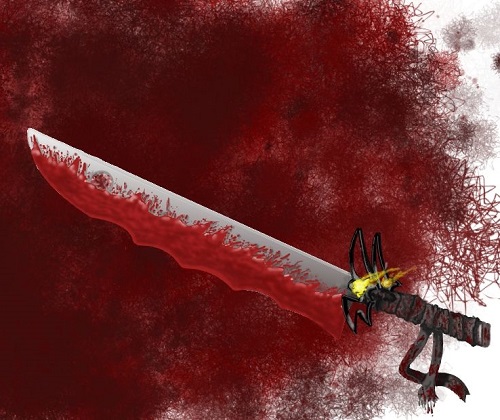FWP:
SETS == A,B; BHI
CHAK-E GAREBAN: {17,9}
SWORD: {1,3}
Everybody will agree that the first line can be read as saying 'There's no other longing in the heart except the longing for the wound of the sword of coquetry'. One could also suggest 'There's no other longing in the heart except the longing that is the wound of coquetry'. It doesn't seem too farfetched, in the context of the heart, to equate a 'longing' directly with a 'wound'. The commentators prefer to imagine that the sword-wound has made a hole through which all the longings have dripped or flowed out of the heart, so that it can't contain them any more, but that reading seems to ignore the presence of juz .
And ignoring juz is a very bad idea. For thanks to the versatility of juz (for discussion of this see {101,1}), there's another, subtler, far more piquant possibility as well: 'Apart from, or without, the wound of the sword of coquetry, there's no longing in the heart'. This reading suggests that the opening made by the wound of the sword of coquetry is what makes it possible for the heart to feel longing; on this view, the verse presents an obvious parallel with {214,1}, in which the opening of a 'wound-mouth' is a precondition for all possibility of speech with the beloved.
Then the second line both reinforces all these possibilities, and complicates them further. Though jeb nowadays generally means 'pocket', in poetry the term is used as a synonym for garebaa;N . Tearing open the neck-opening of his kurta [chaak-e garebaa;N] is one of the lover's standard kinds of behavior; for examples, see {17,9}.
Here, conspicuously, it's the beloved's hand, not the lover's own, that tears the collar. Which brings to mind another idiom: 'to be intimately involved with, to tangle with, to be entangled with' is literally 'to be hand-and-collar with' someone [kisii se dast-o-garebaa;N honaa]. The beloved is not a distant object here, but an active participant.
And here's where the cleverness of that little bhii becomes apparent. If we read it as 'too', the effect is to evoke a kind of parallelism between the lines: the beloved's sword of coquetry has wounded the lover's heart; and similarly, her hands have also torn the collar of his imagination. If we read bhii as 'even', the effect is an upward leap in magnitude: not only have there been effects on his heart, but 'even' imagination-- that last redoubt, that supposedly private sanctuary-- has had its collar torn!
And after all, what does it mean for imagination/thought to have its collar torn? If someone tears his own collar, it's a sign of madness and suffering. If somebody else tears that person's collar, it's surely a sign of some kind of violence-- but what kind, exactly? A rescuer might tear open someone's collar to help him breathe, if the victim was having a heart attack. An enemy might tear open someone's collar in the process of grappling or fighting with him. Would tearing open the collar of the imagination increase the imagination's power, or diminish it, or change it in some other way? As so often, it's left to our own imagination to decide.
Since this is an 'A,B' verse, we also have to figure out the relationship between the two lines. Does one line describe a cause, and the other an effect? (And if so, which way does the causality go?) Or do both lines describe the same general situation? Just to illustrate one possibility: if we decide that 'B causes A', then perhaps the tearing of the collar of the imagination has destroyed its power, and by so doing has prevented it from causing the heart to entertain fresh longings. Or if we decide that 'A causes B', then that terrible sword-wound to the heart has caused the imagination's energy to falter as well. Or perhaps both lines describe the same situation: a total, appropriate focusing of all longing, all desire, on the beloved alone.
I like this verse much better than the one before, but I
have trouble explaining why. It's the second line-- there's something so invigoratingly
over-the-top about the tearing of the collar of the imagination. It's so much
fun to play with in your mind, so suggestive while remaining entirely impossible
to pin down. Whereas the 'wave of wine equals drowsy eyelid' idea isn't nearly
so provocative. Both are artificial, but one is much more active. Yet that's
not quite it either. I haven't (yet?) found a second-order vocabulary to make
distinctions like this, beyond the level of my 'sets' and so on.

Nazm:
By 'collar of imagination' is meant the heart, and when the wound of the sword of coquetry was made in the heart, then the collar of thought was torn. Then how could longing remain in it? (251)
== Nazm page 251